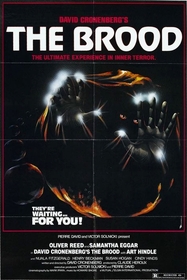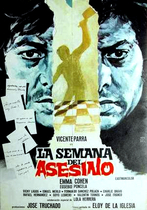Our editor-in-chief Nate Yapp is proud to have contributed to the new book Hidden Horror: A Celebration of 101 Underrated and Overlooked Fright Flicks, edited by Aaron Christensen. Another contributors include Anthony Timpone, B.J. Colangelo, Dave Alexander, Classic-Horror.com's own Robert C. Ring and John W. Bowen. Pick up a copy today from Amazon.com!
The Brood (1979)
David Cronenberg’s 1979 effort The Brood would provide only a single scene for a highlight reel of his entire body of work. You want to like it, to call it a precious gem in Cronenberg's progression of films. You want to be scared, to be disgusted. You want everything you have come to expect from a Cronenberg movie. You end up with disappointment. It's obviously a stepping stone, a film that needed to happen before his much better films could come to be. But that doesn't excuse its faults, and it certainly doesn't give your average viewer a reason to watch The Brood when later, greater Cronenberg films like Videodrome or eXistenZ are readily available.
The Brood’s story centers on Frank Carveth, a father whose wife Nola has gone a little crazy. However, despite her staying at an alternative therapy hospital, Nola and Frank still share custody of their daughter, Candice. Then, while giving his daughter a bath, Frank discovers signs of abuse on his child's body, spurring him into investigating not only his wife, but the bizarre facility at which she stays. He discovers that the alternate therapy, which consists of visualizing your mental anguish as physical attributes, appears to be having real physical effects on the hospital’s patients. Soon, his wife's parents and his own girlfriend fall victim to murders by strange midget creature things. Finally, his daughter is kidnapped, leading to a disturbing showdown that will haunt your nightmares for the rest of your life.
Cronenberg's own divorce and child custody battle inspired this tale, making the domestic horror quite genuine. Losing a loved one, in this case by going dysfunctionally insane, is a tough prospect for anyone, and we all can sympathize with Frank's plight. When this leads to discoveries of abuse of a child, this sympathy is easily transformed to dread. Loved ones hurting other loved ones is something no one wants to deal with, yet still something to which everyone can relate. Add in the creepy, cult-like feel of the alternative therapy institution, and you have a small arsenal of familiar emotions that every average Joe can identify with. Sadly, these domestic fears quickly lose ground to the more fantastical elements of the story.
While brutal murder is scary (particularly the small, mysterious kind), the big reveal that these killings are perpetrated by bizarre mutant, pig-faced dwarves ruins the cozy, believable feel of this domestic horror piece. While Cronenberg's personal style has always been the twisting of the human body in horrible ways (see Videodrome, Naked Lunch or eXistenZ), he comes up a little short with these freaky midgets. While creepy, otherwise normal kids are a familiar horror trope, you don't see mutant Downs-Syndrome pig children in many movies outside of The Brood, and with good reason. They're not scary. They'll only be scary if you personally get hunted down by one wielding a meat tenderizer mallet, and that's never going to happen. The concept itself, a crazy woman's psychoses creating evil murderous creatures, is rather frightening. The creatures themselves, however, completely ruin this otherwise good idea.
However, the supernatural doesn't entirely fail the film. The base theme of emotions becoming physical, the alternative therapy causing these psycho-psychic repercussions, works. From one alternative therapy patient's throat cancer to another's mentally sliced skin, it's just downright unsettling for the mind to have so much power over the flesh. It's these subtle concepts, the function of the external forces on the body, that Cronenberg plays with all through his horror work. In The Brood, it is the power of the human mind, in The Fly, it is mad science, in Videodrome, it is media itself. This is Cronenberg's forte, and it really works for him here.
And then comes the highlight reel scene: The finale, which literally turned this poor reviewer's stomach. It is visceral, highly disturbing, and downright disgusting. It eats away at your psyche, while simultaneously making your stomach churn. It's the simplest form of horror, and Cronenberg's finest - the debasement of the human form in ways that seem all-too-real and yet utterly wrong and impossible. I won't give details in case you plan on seeing the film for yourself, but it's haunting and terrifying. So wrong you don't want to look, but so mesmerizing you can't seem to tear your eyes from it. It is one last, hard-hitting knockout punch. Unfortunately, it also falls flat because the audience hasn’t been softened up enough. The earlier scares simply aren’t enough of a build up for this over-the-top ending.
Truth be told, The Brood isn't that bad. It's certainly better than most schlocky Hollywood horror remakes that are churned out nowadays. However, Cronenberg's films are inevitably rated on their merits as compared to other Cronenberg films. It is here that The Brood comes up short. Everything mentioned here – the domestic horror, the body gore, the supernatural – he does better in other films, leaving The Brood only interesting on the level of seeing Cronenberg’s progression as a filmmaker, a stepping stone in the evolution of his storytelling. Otherwise, there are other, better ways to spend an hour and a half.








